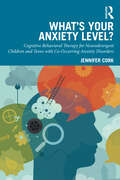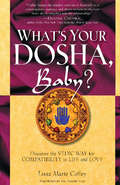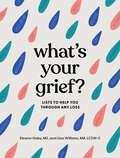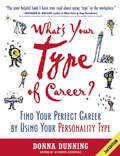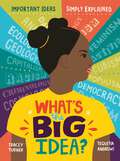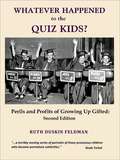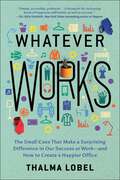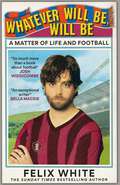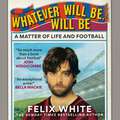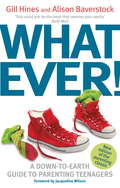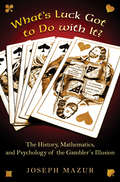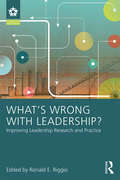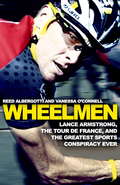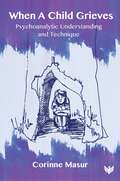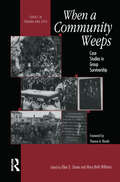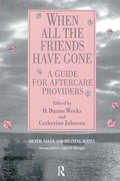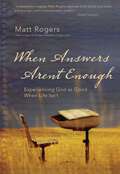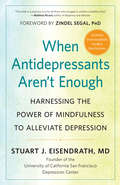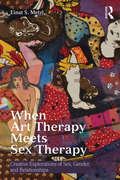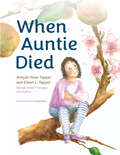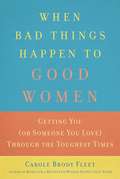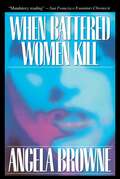- Table View
- List View
What's Your Anxiety Level? Cognitive Behavioral Therapy for Neurodivergent Children and Teens with Co-Occurring Anxiety Disorders
by Jennifer CorkThis book provides clinicians with a cognitive behavioral therapy (CBT)-informed curriculum specifically designed for neurodiverse children and teens with co-occurring anxiety disorders.Research has shown that neurodivergent individuals respond better to mental health interventions when they are adapted to their unique needs. The concepts and strategies in this book, guided by CBT principles, address these needs and provide clinicians with an affirming and supportive approach to treatment with neurodiverse clients. The visually engaging templates throughout help clients recognize and communicate their feelings with others, allowing them to self-regulate and feel their emotions, leading to a sense of achievement during treatment.A must-have resource on the bookshelf of any psychologist, social worker, counselor, and other professionals working with neurodivergent children and teens.
What's Your Dosha, Baby?: Discover the Vedic Way for Compatibility in Life and Love
by Lissa Marie CoffeyThousands of years ago, philosophers and scientists in ancient India devised a system called Ayurveda, or ?the science of life, OCO which explains the nature of everything in the universe. Now, in WhatOCOs Your Dosha, Baby?, author Lisa Marie Coffey applies this ancient wisdom to modern-day relationships, offering readers an exciting new way to measure their compatibility with lovers, friends, co-workers, and family, and arming them with the insight they need to make all their relationships work. After determining their personal dosha?one of three personality types based on physical features and personality traits?readers can learn how their dosha interacts with the others, their physical and emotional communication styles, instinctual preferences regarding food, travel, lifestyle, and work, and much more. Perfect for those looking to end the squabbling with their mate, resolve a conflict with their boss, or get the man or woman of their dreams to commit, WhatOCOs Your Dosha, Baby? will help readers find true happiness and achieve great success in life, love, and relationships. "
What's Your Grief?: Lists to Help You Through Any Loss
by Eleanor Haley Litsa WilliamsA friendly and accessible book of 75 lists that will help anyone experiencing a change or loss—for readers of Maggie Smith, Cheryl Strayed, and Katherine May—from the creators of the popular What's Your Grief website and community.Losses, big and small, turn your world upside down. What&’s Your Grief? will help you through all of them. Many life changes need to be grieved, from the loss of a loved one to the loss of a job, from a breakup to a relocation, and all the rest of life&’s ebbs and flows. In What&’s Your Grief?, mental health professionals Eleanor Haley and Litsa Williams help you examine, investigate, and move through the complex but universal experience of grief.Through seventy-five engaging, informative, and accessible lists, such as to-do (and not-to-do) lists, bucket lists, interactive lists, and more, you&’ll discover:• 5 Little-Known Truths About Grief• 4 Reasons Guilt Is Even More Complicated Than You Think• 9 Tips for Communicating What You Do (and Don&’t) Need• 7 Common Defense Mechanisms• And much moreThere&’s no single way to experience grief. But this unique book will help you move through whatever it looks like and feels like to you.
What's Your Type of Career?: Find Your Perfect Career by Using Your Personality Type
by Donna DunningMatch Your Personality Type to Your Perfect Career—and Find Success! The simple truth is that to be happy and successful in your work, you need a career that not only matches your interests but fits your personality type as well. In this approachable book, author Donna Dunning uses the Myers-Briggs Type Indicator® (MBTI®) to introduce eight distinct ways of working. Encouraging you to reflect on your own natural preferences—using checklists, exercises, strategies and tips—What’s Your Type of Career? provides all the tools you need to discover your own natural preferences and find your ideal career. Are you a Contributor, Expeditor, Explorer or Responder? An Analyzer, Assimilator, Enhancer or Visionary? An Extravert or an Introvert? If you identify yourself as an Extravert and a Responder, you tend to like action, scenarios that are rapidly changing and are not inclined toward a desk job. A profession as an emergency worker, a fi re fighter or a police officer may be for you. This best-selling career guide—now in a fully updated second edition—has been expanded to include the training and educational requirements of a variety of different occupations, and highlights those most in demand. It also includes details on developing type differences later in life, advice for balancing your work and personal life and many, many more preference-based career suggestions.
What's the Big Idea?
by Tracey TurnerHave you ever wondered what capitalism is? How about feminism, ecology, epidemiology or astronomy? Well, this book will give you straightforward, easy-to-understand answers to all your troublesome-word questions WITHOUT going on and on for ages OR using even BIGGER words to explain them. Informative, bite-sized explanations alongside beautiful, eye-catching illustrations will help readers aged 8+ understand crucial concepts, giving them the power to take part in the most important conversations on the planet. Perfect for inquisitive minds, this book will appeal to fans of Goodnight Stories for Rebel Girls, Big Ideas for Curious Minds and beyond.More than 100 big words and ideas, simply explained.
What's the Hurry, Murray?: A Child’s Guide to Finding Calm
by Anna AdamsMurray can’t wait for his friend Florrie to come round to play. That’s until he starts to panic about it… Luckily, Hoots the owl is here to help Murray take a breath and keep calm. A thoughtful and accessible book, What’s the Hurry, Murray? includes practical steps to help children identify and resolve their worries.
Whatever Happened to the Quiz Kids?: Second Edition
by Ruth Duskin Feldman"...a terribly moving series of portraits of those precocious children who became premature celebrities."-- Studs Terkel"...a fascinating look at the lives of child prodigies...a longitudinal study of gifted children that is sincerely told."-- Deborah Earle The Quiz Kids radio and television program was a national institution in the 1940s and 1950s. Ruth and a few other top contestants were guests on the Jack Benny, Fred Allen, and Eddie Cantor shows, starred in movie shorts, and traveled all over the United States selling war bonds during World War II.Did the Quiz Kids fulfill their youthful promise? What were the fruits -- bitter and sweet -- of their childhood experience? What are the lessons for gifted children today? Ruth interviewed her Quiz Kid colleagues to find out how being celebrated for their "brains" affected their lives. The result is Whatever Happened to the Quiz Kids?
Whatever Works: The Small Cues That Make a Surprising Difference in Our Success at Work--and How to Create a Happier Office
by Thalma LobelAn internationally renowned psychologist shows us how overlooked factors in our work days-our physical environments, our unconscious habits, and even traits like our faces and voices-have the power to make or break our careers. In Whatever Works: The Small Cues That Make a Surprising Difference in our Success at Work—and How to Create a Happier Office, Thalma Lobel, one of the world's leading experts on human behavior, explores groundbreaking psychological research on job performance, satisfaction, and creativity. Lobel goes beyond obvious considerations like salary, title, and company culture to shed light on the hidden factors-often unrecognized, counterintuitive, or invisible-that have profound effects on how well we can do our jobs and how happy we are at work. Did you know that just doodling in a certain way can increase your creativity? That looking at something green for forty seconds will improve your attention? That crossing your legs similarly to an interviewer could get you the job? That the mere presence of a smartphone on your desk can lessen your performance, even if it's turned off? That being in a warmer room makes you more likely to want to conform with the group, affecting your decision-making? These are the invisible factors that nudge our behavior on a daily basis, and combined, have a real and significant bearing on our success-or failure-at work. In today's competitive market, where even tiny differences can be decisive, for both employees and organizations, exploiting such factors can make all the difference. The more you know about the subtle elements that can help or hinder you on the job, the better equipped you can be to take control and navigate today's competitive work world. Helpful for anyone from individual employees to managers to leaders of large organizations, Whatever Works shares valuable insights and practical takeaways to transform your professional life.
Whatever will be, will be: A Matter of Life and Football
by Felix White'A book so beautiful that it finally made me understand what football means. An exceptional writer.'- Bella Mackie'So much more than a book about football. A book about aging, community and memory. Rich in detail and great jokes. I wish I had written it.' - Josh Widdicombe'Mesmerising and unputdownable, like Fever Pitch meets The Sportswriter. I commend it in the highest terms.' - Amol RajanFrom the Sunday Times bestselling author of It's Always Summer Somewhere comes a moving and often hilarious journey through the 2024/25 FA Cup - from the first muddy preliminary round in Penrith to a glorious sunny day at Wembley.On the brink of turning 40, Felix White sets out to watch a match from every round of the Cup, meeting fans, players and dreamers at every level of the English game. As he travels the country, football becomes a way to explore memory, identity, grief and joy. While he reflects on his own lifelong obsessions, his story becomes a unique expression of how the game communicates something vital, both literal and internal, between a child and an adult.Told with lyrical wit and heartfelt honesty, Whatever Will Be, Will Be is more than just a story about football - it's about growing up, holding on and the strange ways sport connects us all.
Whatever will be, will be: A Matter of Life and Football
by Felix White'A book so beautiful that it finally made me understand what football means. An exceptional writer.'- Bella Mackie'So much more than a book about football. A book about aging, community and memory. Rich in detail and great jokes. I wish I had written it.' - Josh Widdicombe'Mesmerising and unputdownable, like Fever Pitch meets The Sportswriter. I commend it in the highest terms.' - Amol RajanFrom the Sunday Times bestselling author of It's Always Summer Somewhere comes a moving and often hilarious journey through the 2024/25 FA Cup - from the first muddy preliminary round in Penrith to a glorious sunny day at Wembley.On the brink of turning 40, Felix White sets out to watch a match from every round of the Cup, meeting fans, players and dreamers at every level of the English game. As he travels the country, football becomes a way to explore memory, identity, grief and joy. While he reflects on his own lifelong obsessions, his story becomes a unique expression of how the game communicates something vital, both literal and internal, between a child and an adult.Told with lyrical wit and heartfelt honesty, Whatever Will Be, Will Be is more than just a story about football - it's about growing up, holding on and the strange ways sport connects us all.
Whatever!: A down-to-earth guide to parenting teenagers
by Alison Baverstock Gill HinesDo you find bringing up teenagers more of a pain than a pleasure?Raising teenagers can test parental love to breaking point, particularly if you have previously enjoyed a close and loving relationship. The child whose every joy and sadness you shared has suddenly become taller than you, louder than you, with an inside knowledge of all your failings - and a sudden urge to point them out. What's more, this newly arrived creature may spend half their life glued to a gadget, talk and dress in a way you find alien and respond to all queries with a grunt or a dismissal - whilst expecting ever-greater financial hand-outs.Help is however at hand. This completely revised and updated edition of a parenting classic is full of advice to help teenagers, their parents and the rest of the family. It offers a wealth of sound advice plus tried and tested strategies for every aspect of life with a teen - from alcohol to cyberbullying, sexting to household chores - which you can put into practice immediately. You'll quickly wonder how you ever managed without this book.
What’s Luck Got to Do with It?
by Joseph MazurWhy do so many gamblers risk it all when they know the odds of winning are against them? Why do they believe dice are "hot" in a winning streak? Why do we expect heads on a coin toss after several flips have turned up tails? What's Luck Got to Do with It? takes a lively and eye-opening look at the mathematics, history, and psychology of gambling to reveal the most widely held misconceptions about luck. It exposes the hazards of feeling lucky, and uses the mathematics of predictable outcomes to show when our chances of winning are actually good. Mathematician Joseph Mazur traces the history of gambling from the earliest known archaeological evidence of dice playing among Neolithic peoples to the first systematic mathematical studies of games of chance during the Renaissance, from government-administered lotteries to the glittering seductions of grand casinos, and on to the global economic crisis brought on by financiers' trillion-dollar bets. Using plenty of engaging anecdotes, Mazur explains the mathematics behind gambling--including the laws of probability, statistics, betting against expectations, and the law of large numbers--and describes the psychological and emotional factors that entice people to put their faith in winning that ever-elusive jackpot despite its mathematical improbability. As entertaining as it is informative, What's Luck Got to Do with It? demonstrates the pervasive nature of our belief in luck and the deceptive psychology of winning and losing.
What’s Wrong With Leadership?: Improving Leadership Research and Practice (Leadership: Research and Practice)
by Ronald E. RiggioLeadership practitioners and those who seek to develop leadership are concerned with whether they are using evidence-based best practices to develop leadership capacity in themselves and others. Are we indeed using best practices in the study, practice, and development of leadership? This book seeks to draw attention to the limitations of extant work on leadership, and to provide suggestions for a way forward. Presenting chapters on topics ranging from research methodology, gender and cross-cultural issues in leadership studies, and the role of the humanities in our understanding of leadership, the book represents a rigorous multidisciplinary collaboration. This is a must-read for graduate students studying leadership, leadership consultants and trainers, leadership scholars, and anyone who practices, teaches, or seeks to develop leadership. It will help expand the horizons of how we think about and practice leadership.
What’s Your Vibe?: Tuning into your best life
by Craig David***I'm still learning, still making mistakes, but I feel ready now - after a lot of twists and turns along the way - to share my journey with you. In his much-anticipated first book, celebrated singer-songwriter Craig David takes us on a journey of connecting, disconnecting and reconnecting, weaving together stories of his life and music - starting with his early days in Southampton working with The Artful Dodger, to his overnight chart-topping success, through to the present day, and everything in between.This is Craig as we've never seen him before - the always-positive showman, baring his soul for the first time.From physical pain, lost love, public humiliation and depression, Craig takes us past his comfort zone, in a raw, honest and courageous account of his own lived experience. In opening up about how he overcame these obstacles, Craig shares his insight and provides practical advice that will help us to navigate the daily challenges we all face.This is Craig's story of how he learned to tune into his best life.
Wheelmen: Lance Armstrong, The Tour De France, And The Greatest Sports Conspiracy Ever
by Vanessa O'Connell Reed AlbergottiWith a new Afterword.Lance Armstrong won a record-smashing seven Tour de France yellow jerseys after staring down cancer, and in the process became an international symbol of resilience and courage. In a sport constantly dogged by blood doping scandals, Armstrong seemed above the fray. Never had cycling - or any sport-boasted such a charismatic and accomplished champion. Then, in the summer of 2012, the legend imploded. The rumors that had long dogged Armstrong began to solidify. Buried evidence surfaced. Hushed-up witnesses came forth. Armstrong's Tour victories were stripped from him. His sponsors abandoned him. In January 2013, Armstrong finally admitted doping during the Tours, and in an interview with Oprah, described his "mythic, perfect story" as "one big lie." But his admission raised more questions than it answered. With over three years of extensive reporting, deep sourcing, and interviews with nearly every key player, including Armstrong, Reed Albergotti and Vanessa O'Connell have established themselves as the undisputed authorities on this story. Wheelmen reveals the broader tale of how Armstrong and his supporters used money, power, and cutting-edge science to conquer the world's most difficult race. It offers a riveting look at what happens when enigmatic genius breaks loose from the strictures of morality. It reveals the competitiveness and ingenuity that sparked blood doping as an accepted practice, and shows how Americans methodically constructed an international operation of spies and breakthrough technology to reach the top. Lance Armstrong survived and thrived against nigh-insurmountable odds and built a team of unprecedented accomplishment. But in the end, his own outsized ambition destroyed it. At last exposing the truth about Armstrong and American cycling, Wheelmen paints a living portrait of what is, without question, the greatest conspiracy in the history of sports.
When A Child Grieves: Psychoanalytic Understanding and Technique
by Corinne MasurFor many years, debate has raged as to whether children are capable of embarking on a true mourning process. In When a Child Grieves, Corinne Masur provides an excellent overview of the myriad psychoanalytic theories on the subject and demonstrates conclusively that children can and do mourn. She describes how children and adolescents experience grief and how the mourning process can go awry. Dr Masur provides ample guidelines for the evaluation and treatment of children and adolescents struggling with their grief, alongside a multitude of clinical examples to illustrate her salient points. One detailed and poignant case history is returned to throughout the book, that of a three-year-old who lost his father to suicide. This sensitive and important work fills a void in the literature and will become a key text for trainees and qualified psychoanalysts, psychotherapists, clinicians, and other professionals working with bereaved children.
When A Community Weeps: Case Studies In Group Survivorship (Series in Trauma and Loss)
by Mary Beth Williams Ellen S. ZinnerWhen a Community Weeps provides a model for effective counselor intervention in bereaved communities. Individual chapters have been written by traumatologists, psychiatrists, psychologists, social workers, and family members who have witnessed the effects of traumatic events first hand. Each chapter presents a specific traumatic event and gives perspectives on how these events affected the individuals involved as well as the community as a whole.
When A Stranger Calls You Mom
by Katharine LeslieA child development and relationship perspective on why traumatized children think, feel and act the way they do.
When All the Friends Have Gone: A Guide for Aftercare Providers (Death, Value and Meaning Series)
by Catherine Johnson Duane O. WeeksThis volume is a collection of writings from pioneers who have created aftercare programs. The perspectives they offer are wide - from the practical how-to's in developing a program to the more personal stories that enlighten the reader on the motivation behind those who founded the programs. The chapters include information on funeral home based programs as well as those based in schools, hospitals and the military.
When Answers Aren't Enough: Experiencing God as Good When Life Isn’t
by Matt RogersOn April 16, 2007, the campus of Virginia Tech experienced a collective nightmare when thirty-three students were killed in the worst massacre in modern U. S. history. Following that horrendous event, Virginia Tech campus pastor Matt Rogers found himself asking and being asked, "Where is God in all of this?" The cliché-ridden, pat answers rang hollow. In this book, Matt approaches the pain of the world with personal perspective--dealing with his hurting community as well as standing over the hospital bed of his own father--and goes beyond answers, beyond theodicy, beyond the mere intellectual. When Answers Aren't Enough drives deeper, to the heart of our longing, in search of a God we can experience as good when life isn't.
When Antidepressants Aren’t Enough: Harnessing the Power of Mindfulness to Alleviate Depression
by Stuart J. EisendrathFor nearly two decades, Dr. Stuart Eisendrath has been researching and teaching the therapeutic effects of mindfulness-based cognitive therapy (MBCT) with people experiencing clinical depression. By helping them recognize that they can find relief by changing how they relate to their thoughts, Eisendrath has seen dramatic improvements in people&’s quality of life, as well as actual, measurable brain changes. Easily practiced breath exercises, meditations, and innovative visualizations release readers from what can often feel like the tyranny of their thoughts. Freedom of thought, feeling, and action is the life-altering result.
When Art Therapy Meets Sex Therapy: Creative Explorations of Sex, Gender, and Relationships
by Einat S. MetzlAppropriate for both sex therapists and art therapists, When Art Therapy Meets Sex Therapy explores sexuality and gender through the use of art making, connecting relevant theories and research from both fields. It begins with a historical review of how explorations of anatomy, physiology, and sexual identity manifested in art making in different cultures and discusses why a clinician must take these spiritual, medical, and socioeconomic factors in account to offer effective and culturally competent therapy. The second part of the book discusses clinically effective treatments in art and sex therapy, and contains numerous case illustrations. Included are interventions for important issues in therapy, such as exploring gender identity, sexual health and shame, processing sexual abuse, couples' intimacy, parenting concerns regarding their children's sexuality, and treating sex addiction.
When Auntie Died
by Eileen TapperAs a mother to six-year-old Amiyah and a therapist, when the pandemic kept us away from her Auntie, I recorded her emotions and thoughts in the year following her death. When the time was right, we sat down together and pieced together her story. These are Amiyah's words, edited by me, written into a story. There were many factors impacting the ability to process the death of a loved one during the pandemic. But the most significant of all was the lack of physical contact with loved ones and friends, family visits in hospitals and nursing homes, viewings, funerals, and for the young child, a means to make death real.
When Bad Things Happen to Good Women: Getting You (or Someone You Love) Through the Toughest Times
by Carole FleetWhen Bad Things Happen to Good Women is a survivor's toolkit by a leading expert in how to survive tragedy and thrive afterward. Carole Brody Fleet's book is a chorus of voices of females who overcame intense odds and rebounded. Filled with moving stories and specific steps on how to move on, these words of hard-won wisdom make an important component in dealing with trauma. Real-life stories and practical advice on life-altering topics are shared by women of all walks of life. New York Times best-selling author and CBS reporter Lee Woodruff tells the story of how her news correspondent and anchorman husband Bob Woodruff nearly died from a roadside bombing in Iraq. Kristen Moeller of Tiny House Nation on A&E describes the devastating wildfire that destroyed her home, and how she overcame losing literally everything. A bride-to-be shares the wedding day that became a memorial for her groom when he died in a car wreck on his way to the church. No matter the trauma, Carole Brody Fleet makes sure readers are equipped with the tools and techniques to thrive after any tragedy -- with a big heart and peaceful mind intact.
When Battered Women Kill
by Angela BrowneA compassionate look at 42 battered women who felt "locked in with danger and so desperate that they killed a man they loved"; scholarly and compelling.
